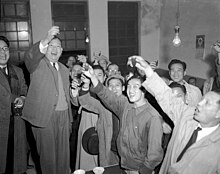Tangwai movement
Although the ruling Kuomintang (KMT) had allowed contested elections for a small number of seats in the Legislative Yuan, opposition parties were still forbidden.
In response to more native Taiwanese taking public office, the tangwai attempted to contest elections in 1975-1976 and demand even more changes to the political system.
On the day of the demonstration, activists took to the streets in a parade formation in Kaohsiung, but were diverted several times due to police blocking their intended route.
On the other hand, scholars argue that the various other demonstrations by common citizens helped keep the tangwai movement alive despite the mass imprisonment of its leaders.
Examples of other social movements from both the middle and working classes which who staged public demonstrations included farmers protesting against corporate farms, and environmentalists opposing a proposed factory from DuPont to be built in Lukang.
The government confiscated these works, which led the Church to appeal to the Carter administration of the United States to highlight what it considered a human rights violation.
[6] Tangwai members, including Shih Ming-teh and Lin Yi-hsiung, were often harassed or imprisoned by the KMT government, especially in the wake of the Kaohsiung Incident.

